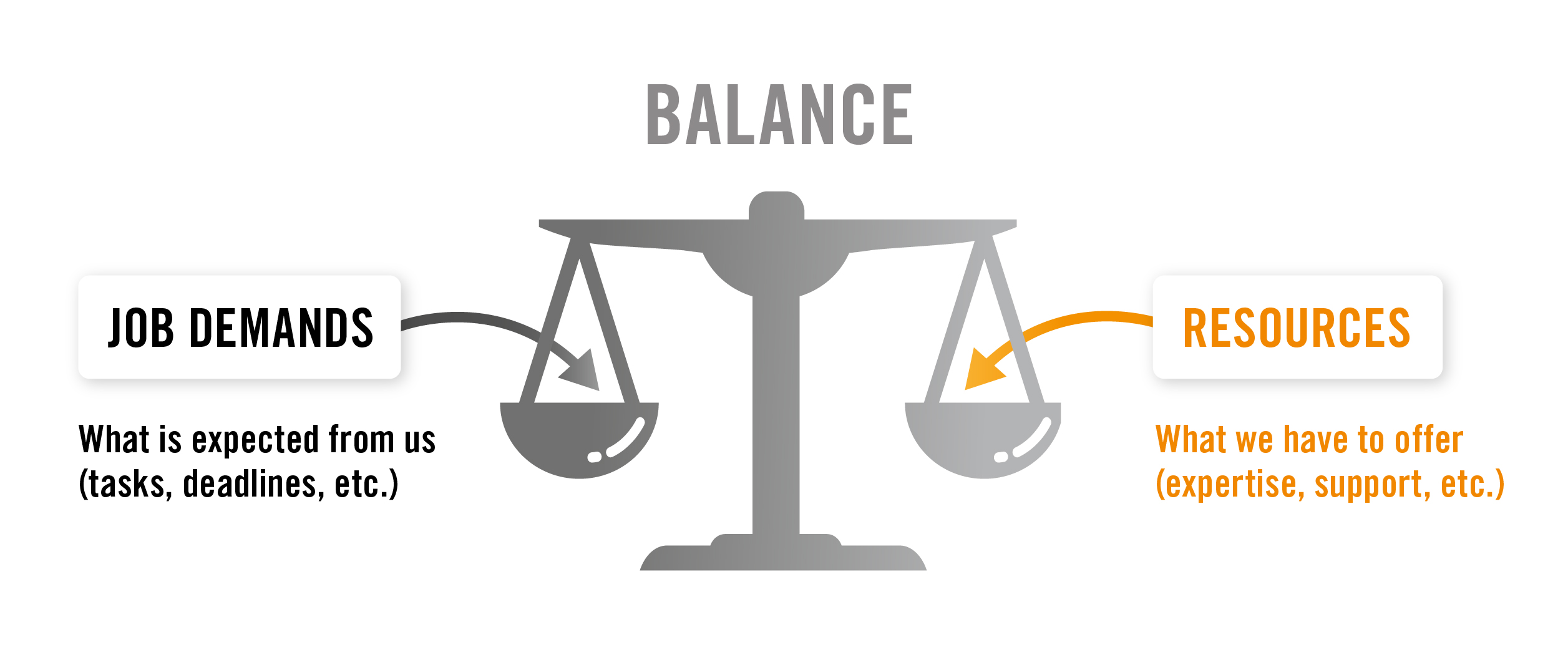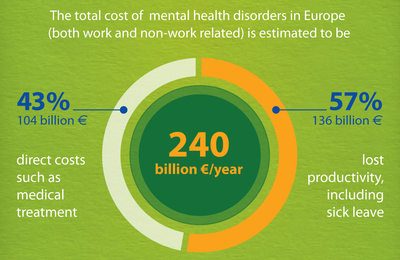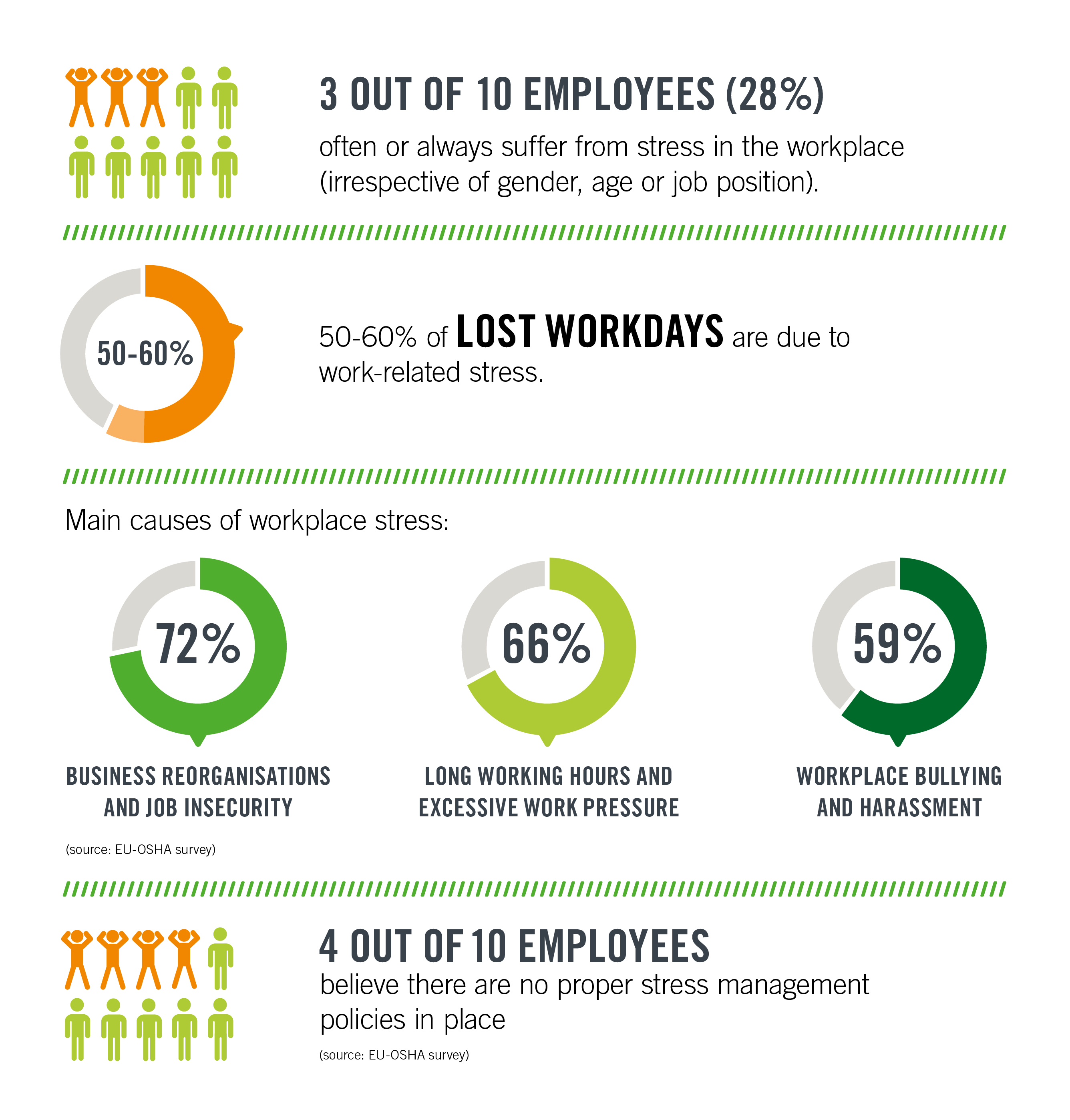

- Home
- Healthy employees
- Workplace stress
A stress-free work environment is a healthy work environment. Too much work, too little work, feeling overqualified for the job, issues with co-workers, vague rules and regulations, etc. can all lead to workplace stress. Workers who feel good at work are less likely to suffer from stress, burnout or illness-related absenteeism. An integrated approach towards stress – with a focus on prevention, control and remediation – can bring peace and balance to your organisation.
Facts
Inefficient work environments lead to stress
Stress is a part of any organisation but doesn’t always manifest itself in the same way. Work-related stress emerges when the demands put on workers outweigh their ability to cope. This type of stress is not a personal shortcoming but rather the result of a work environment that is inefficient from a psychosocial perspective.

When the setup, organisation and management of work duties fail to take into account the well-being of workers, psychosocial risks may arise. Some working conditions that contribute to such situations are:
- excessive workloads and time constraints
- conflicting demands
- lack of clarity about the role of the employee
- ineffective communication
- poorly managed changes within the organisation
- lack of support from management or colleagues
If your workers are affected by chronic workplace stress, they may develop (serious) mental and physical health issues.
Individuals may experience:
- burnout and depression
- concentration issues
- problems at home
- disrespectful behaviour in the workplace (including bullying, conflicts, aggression)
- drug and alcohol abuse
- poor physical health, cardiovascular problems and musculoskeletal problems
Stress in numbers: a harsh reality
In Europe alone, the total cost associated with mental health issues (whether or not work-related) is estimated at 240 billion euros a year. More than half of this is due to productivity losses, including illness-related absenteeism.

Impact of workplace stress

A survey by Mensura of 28,000 employees shows that no less than 55% of employees experience substantial stress at work. In the case of non-managerial employees – both blue-collar and white-collar – it concerns 5 out of 10 employees. For managerial employees, this rises to 6 out of 10.
Different profiles also cope with stress differently: 4 out of 5 (81%) managerial employees claim to do this in a healthy way. This is different for non-managerial employees: 1 out of 4 (24%) says it is difficult to cope with work stress.
Mensura will advise you
Employees can also transform stress into energy by adopting an approach that takes into account the organisation, the group setting, and the individual, for instance. Workers who experience less stress will enjoy their work more. Investing in stress prevention and reduction is therefore highly recommended.
- Stress is not just a personal matter. It needs to be managed at organisational level, at group level, and at the level of the individual.
- Respect the mental and emotional coping mechanisms of your workers. A proper work-life balance, with adequate time for relaxation, is paramount.
- Map the current situation of your organisation with the help of experts and compare it against your ideal situation.
How is the workload distributed? How do your workers interact with one another? How much work is expected from them? - Ensure that your workers are self-reliant. Being able to recognise symptoms of stress is the first step towards self-management or seeking help.
Result
- A structural, preventive and curative approach towards stress that facilitates an appropriate and effective balance between work pressure and performance. Your organisation will be provided with solutions that are tailored to your specific needs.
- Workers gain resilience and feel more supported and motivated.
- Productivity levels are increased and are less subject to stress-related absenteeism.
- Concrete tips and advice that can also be implemented by direct supervisors to manage stress levels. You will be given guidelines on how to discuss the issue of workplace stress with your workers.
Mensura will train your employees
Mensura offers specific training courses for both supervisors and workers to help identify and alleviate workplace stress.
Training courses on stress management
Workshop: Increasing resilience